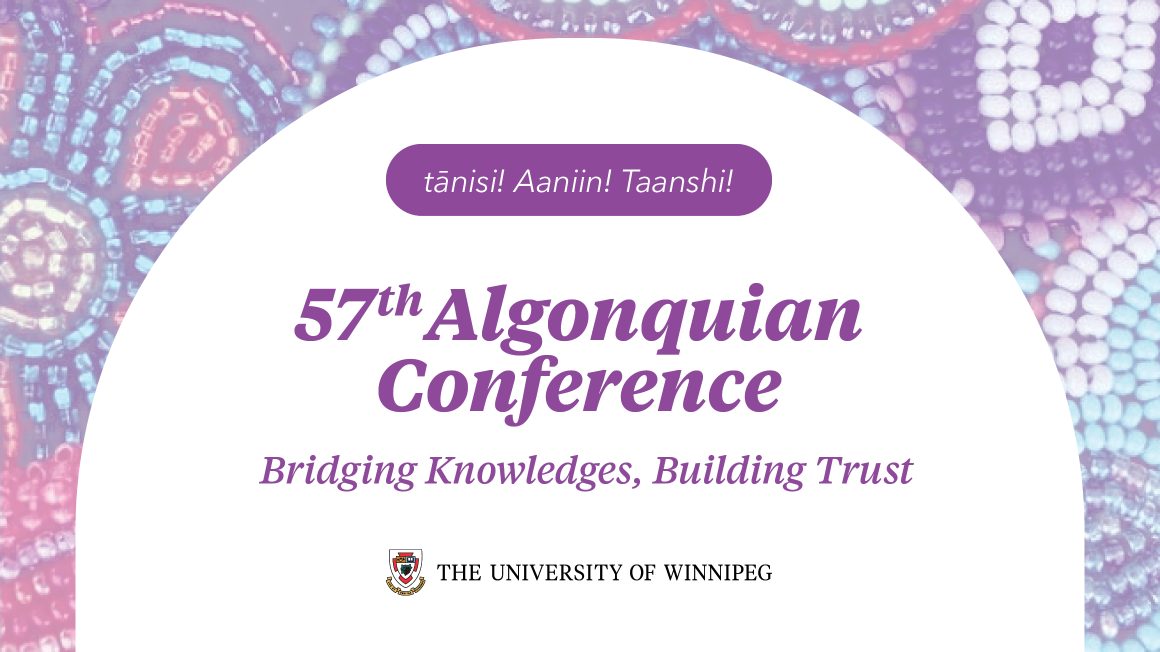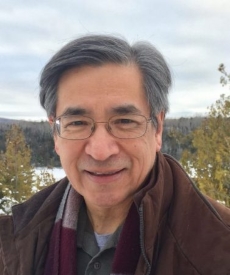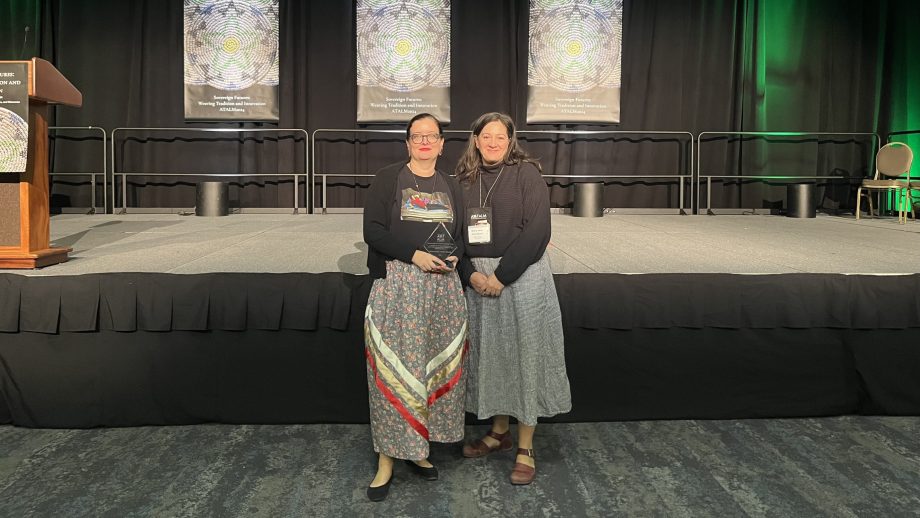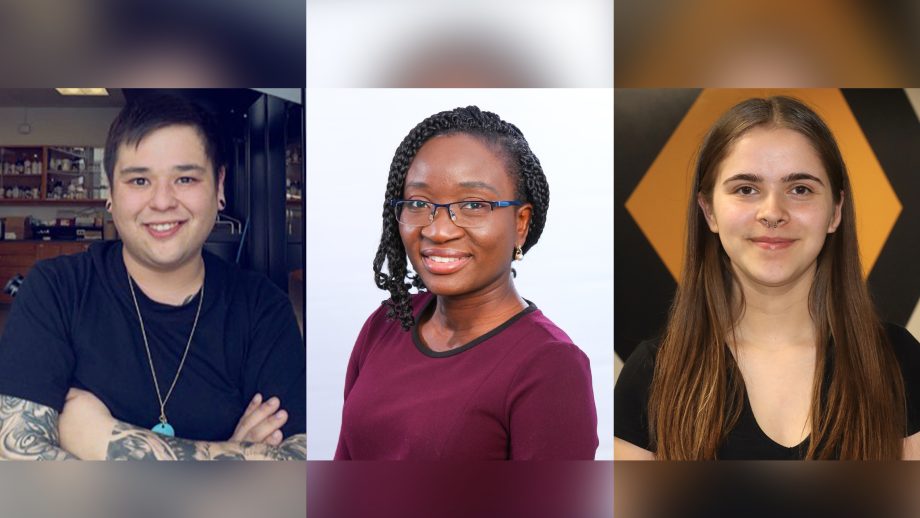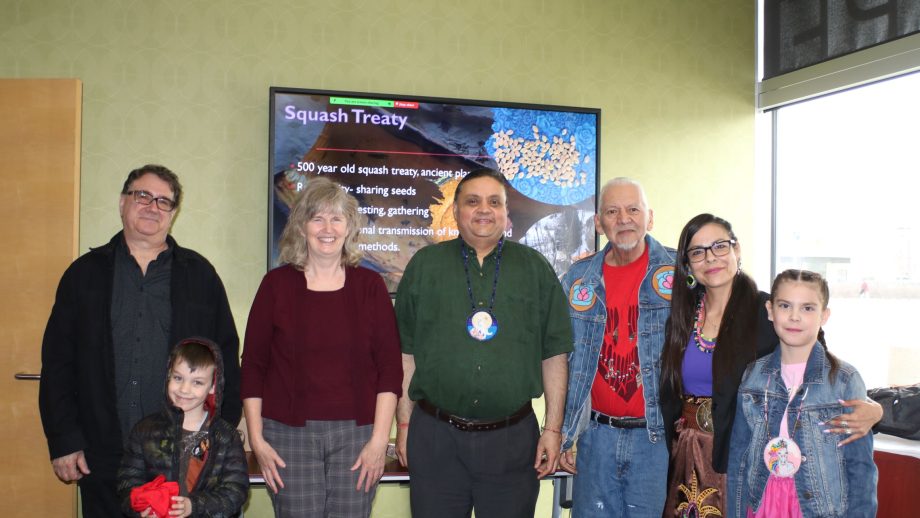The 57th Algonquian Conference, an international gathering of Indigenous and non-Indigenous scholars, students, cultural workers, language practitioners, artists, and community members, will take place October 17-19 at The University of Winnipeg. Registration is now open and a list of key dates is available online.
Up to 200 attendees are expected from across Canada, the United States, and beyond. In-person and online presentations are planned, plus roundtables, workshops, panels, a keynote address, and a special variety show evening.
The Algonquian Conference is an annual interdisciplinary forum for research on topics related to Algonquian peoples, said Heather Souter, a Michif (Métis) faculty member in the Department of Anthropology and Indigenous Languages program and member of the conference’s organizing committee.
Algonquian peoples represent the largest combined group of First Peoples in Canada.
Heather Souter
Canada and the U.S. take turns hosting the annual conference. Last year’s gathering took place in Oklahoma City. UWinnipeg is pleased to host this year’s conference. For the first time, the majority of the conference’s organizing committee is Indigenous.
“The committee has been working hard to ensure all participants can engage with each other in ways that help them see beyond stereotypes, trauma, and superficial differences to our shared humanity and a shared and hopeful future,” Souter said.
“We aim to help foster relationships between Indigenous and non-Indigenous scholars and community members based on mutual respect and reciprocity while promoting recognition of each Indigenous nation’s sovereignty and autonomy, particularly in the context of knowledge and research.”
The Algonquian family of languages includes Cree, Anishinaabemowin, Blackfoot, Cheyenne, Mi’kmaq, Arapaho, and Fox-Sauk-Kickapoo, and others. Both Southern and Northern Michif are rooted in this language family as well.
“Algonquian peoples represent the largest combined group of First Peoples in Canada,” Souter said. “They are found from the East Coast of what is now known as Canada and the United States, to as far west as northern British Columbia and as far south as Oklahoma.”
Showcasing community-based research
This year’s conference theme—“Bridging Knowledges, Building Trust”—was chosen to emphasize the importance of fostering collaborative and respectful partnerships across communities and disciplines.
Souter said it’s a theme that centres relational accountability in the recognition and application of Indigenous knowledges and the co-creation of new knowledges. Organizers hope the conference will create a “third space” where stories, research, and experiences can be shared.
Previous iterations of the conference have focused more on theoretical linguistics. This year’s gathering will take a more applied approach, highlighting community-based and community-driven research that puts Reconciliation into practice in fields such as language revitalization and reclamation, linguistics, anthropology, history, education, political science, art, music, and literature.
Each day of the conference will open with a session on a topic relevant to the conference theme. Breakout presentations, talking circles and roundtables, workshops, and research creations and artistic outputs will follow, with question periods to further facilitate discussion.
A special Elders’ panel on language revitalization, and another on Indigenous language technology, are in the works. A workshop for high school students on Indigenous language technology is also being planned as a side event.
An evening of Algonquian cabaret
The evening of Friday, October 17 will employ a cabaret variety show format with food and live performances that highlight the languages and cultures of Indigenous peoples represented at the conference.
Co-produced by Kiyanaan Indigenous Theatre Festival and hosted by Philip Geller and Charlene Van Buekenhout, the evening will also honour the cohort from the UWinnipeg’s Teaching Indigenous Languages for Vitality Certificate Program and others who have made significant contributions to the field of language revitalization. Applications to perform are now open.
Meet the keynote speaker
Dr. Bernard Perley, a Maliseet scholar from Tobique First Nation in New Brunswick, will deliver a keynote address on Friday, October 17. Dr. Perley, who holds a PhD from Harvard and is President of the Canadian Anthropology Society, teaches in UBC’s Institute for Critical Indigenous Studies.
A self-described activist/advocate Indigenous linguistic anthropologist, Dr. Perley is a scholar committed to Indigenous community-based research and advocacy not only through publications and professional conferences, but also through collaborative art installations, language revitalization workshops, and his personal cartoon series Having Reservations, which explores humour as a means of healing historical trauma associated with colonial oppression.
More information on the 57th Algonquian Conference can be found on its UWinnipeg website. Questions about the conference can be emailed to AC57@uwinnipeg.ca. Following the conference, presenters can submit a research paper to be published in the conference proceedings. Papers from past conferences are available online.
The 57th Algonquian Conference is supported in part by funding from the Social Sciences and Humanities Research Council, UWinnipeg, the Department of Anthropology, the Office of Indigenous Engagement, and the Office of the Provost and Vice-President, Academic.

